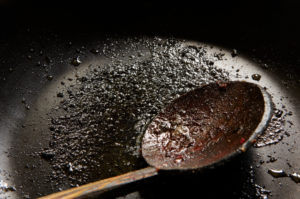Chances are, your pots and pans end up coated with a layer of fat, oil, or grease (also called FOG) several times a week. And as tempting as it may be to just pour that greasy mess down the drain, it’s one of the worst things you can do to your home’s plumbing: not to mention the public sewer system.
FOG is in a liquid state while warm or at room temperature, which tends to make it seem harmless when it’s time to clean up after a home-cooked meal. But as it cools, it solidifies and begins to coat the interior of your pipes. To make matters worse, any food particles that may be sent down the drain in Birmingham can attach to the grease and further complicate matters. Over time, this greasy build-up can restrict water flow, clog pipes, and even cause sewer back up. And that makes for a potentially messy, and costly, situation.
The best way to prevent grease build-up is to properly dispose of cooking oils.
That’s why, for starters, you should keep a jar, coffee can, or other lidded recyclable container in your kitchen. As you clean up after a delicious meal, carefully pour any grease into the container and secure the lid. Once the container is full, take it to a local recycling facility that accepts cooking oil.
Should you accidentally pour some cooking oil down the drain, flush it with boiling water to move the grease further down. Then pour a ¼ cup of baking soda followed by a ¼ cup of white vinegar. Let that mixture stand for at least 15 minutes, then flush it with boiling water once again.
If you notice that water is draining slowly from your sink, hear a gurgling sound, or smell a foul odor from your drains, you might have grease build-up in your pipes. If that’s what’s going on in your kitchen, now’s a great time to pick up the phone and contact Eagle Service Company for our professional drain cleaning services. We’ll have the problem fixed in no time.


